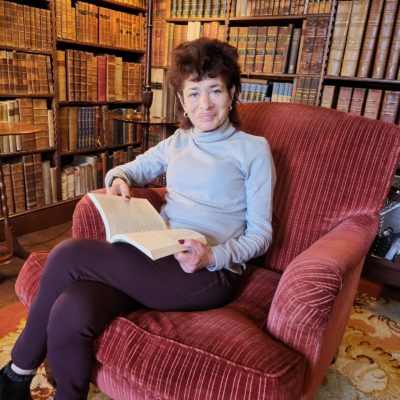Isabelle Seddon
I was born in Plymouth into a religious family and grew up there and Bournemouth until moving to Birmingham to study mass media communications. After graduating I trained at Capital Radio and then worked as an editor at IPC magazines. At 24, I emigrated to Israel where I lived for 11 years. During that time I married, had two children and freelanced for the Jerusalem Post, the Israel Economist and edited the Israel Museum, Hebrew University and El Al magazines. A keen arts-lover, I ran a gallery for new immigrant artists at the Jerusalem Theatre.
After recovering from a personal tragedy, I realized I wanted to help people overcome their traumas and back in London I trained as a counsellor and drama therapist. I worked for Jewish Care, creating new activities for the elderly and ran reminiscence groups and programmes for those with mental health issues and dementia. I also worked as a counsellor in a GP’s practice.
My love of history, telling stories and meeting new people led me to train as a City of London, Westminster and blue badge guide. I am passionate about London and seeing tourists experience London for the first time is so wonderful. I love to take them to offbeat neighbourhoods and show them the city’s vibrant multiculturalism and energy. I have a doctorate in philosophy, specializing in the Jewish East End of London and wrote a book, East End Jews and Left-Wing Theatre . I am currently doing post-doctoral research on Jewish British women post-1945 in the public arena.
Since the pandemic, I’ve become more concerned about food poverty and have started volunteer work with Food Bank Aid: North London and JW3 Food Bank. It’s rewarding to meet different people from a wide range of social backgrounds. I’ve recently been reflecting more on why I always feel the need to get involved and help in some way. As a young teenager I would go every Sunday afternoon to read aloud books and write letters at a Home for the Blind. Whilst at university, I would do night shifts at soup shelters and through the years have worked with the homeless and with women escaping domestic violence. I worry about people on the edge of society and wish I could do more to help them.
My passions include walking and travel. I met my husband Ivor in 2001 on a charity trek along the Great Wall of China. He is the perfect partner and we have been fortunate to travel the world together, taking part in intrepid adventures that have included North Korea, Iran, Papua New Guinea as well as travels across Africa and South America. I have a keen interest in tribes and social anthropology and have loved travelling the world to experience as much adventure as possible.
Five years ago, I was diagnosed with Stage 4 cancer. I’m on daily chemotherapy and some days are a struggle. Determined not to give in, I am still guiding, go Nordic walking on Hampstead Heath and go regularly to the theatre (my great love), the cinema and art galleries.
I live by two mottos that have served me well:
- Every year I set myself the task of doing something totally new and challenging to keep me motivated
- Live everyday like it’s your last. Cram as much in as you can. Embrace everything.
As part of my doctorate, I was initially interested in exploring significant British-born Jewish women , but there weren’t enough available resources, almost as if they had been written out of history. So, I vowed to bring these women’s stories to life, which led me to undertake extensive research over several years.
“Intrepid Pioneers: Jewish Women in the Public Arena” highlights the achievements of female trailblazers and looks at how their Jewish background contributed to their success and exposes the intersections of gender, religion and ethnicity/race in British history. Often battling antisemitism in British society, and gender prejudice within and outside the Jewish world, what they achieved was remarkable.
My second book, “Creating A Storm”, features British women who made their mark in the arts, including theatre, film, music, and literature.
Share Circle Square: Member Q&A
- What 3 words best describe you? Determined, compassionate and resilient
- If you could offer your younger self one piece of advice, what would that be?Don’t worry so much about what people think of you. Listen to your inner self.
- What do you consider to be your greatest achievement? Still working on it…
- Which person (dead or alive) would you most like to invite to dinner? My late father whom I learnt so much from and who was a source of great wisdom…
- How has age strengthened your advantage? Gaining confidence that has enabled me to put things more into perspective
- What inspired you to join Circle Square? The opportunity to meet new people, to exchange ideas and be inspired.


